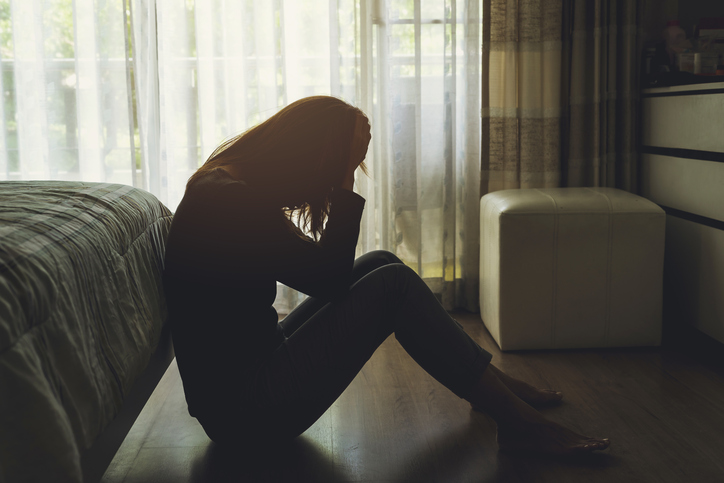Depression is the leading cause of disability worldwide, according to the World Health Organization, and affects women at about twice the rate that it does men.
In Connecticut, 21.4 percent of women report experiencing depression, compared with 13.4 percent of men, according to 2015 Department of Public Health data.
Millennial women in the state experience depression four more days in an average month than their male counterparts, the Status of Women data project reported this year.
Women are more likely to use mental health services than men, but studies consistently show that the majority of Americans with depression go untreated.
In this podcast, sponsored by ConnectiCare, Colleen Shaddox discusses depression and pathways to better mental health with Yale’s Carolyn Mazure, and NYTimes best-selling author Luanne Rice.
Though the stigma around mental illness has lessened, experts say that it still keeps women from getting help. “I think we’ve made some inroads in that regard, but I think that still exists. It’s very important for people to understand that this is not a failure, this is really a biological illness, and that if you’re having symptoms, it’s really important to get help,” said Carolyn Mazure, director of Women’s Health Research at Yale.

Robert Lisak Photo.
Carolyn Mazure, head of Women’s Health Research, Yale School of Medicine.
Women are prone to depression, often triggered by hormones, such as during the post-partum period, but research suggests that women have a different biological response to stress throughout their lives that contributes to higher rates of depression, according to Mazure.
Biology is not the whole story. Mazure pointed out that women on average have less money and more caregiving responsibilities than men.
Dr. Carl Mueller, associate chief of psychiatry at Stamford Hospital, said that in the workplace women often have “responsibility without authority,” a stressful, no-win situation.
Girls and women are also sexually abused at higher rates. More women are coming in for treatment as the #MeToo movement brings up old trauma, Mueller said. “It is empowering,” he said. “People would like to address those issues that sometimes have tormented them for years.”
Connecticut author Luanne Rice, who writes about her depression, recalled how the stigma made it difficult to get help. She missed a lot of school growing up in the 1960s. “I couldn’t say, ‘I feel down. I feel depressed,’” she said. “Nobody used that word back then. Or if they did, it wasn’t in my family.”
Rice said she was sexually abused as a child by a trusted adult. She was also burdened by a precocious sense of responsibility for keeping her family together, though her beloved father’s alcoholism put enormous strain on her parents’ marriage. Finally, a teacher at her high school saw that Rice was depressed and urged her family to get her counseling. “They were aghast,” Rice remembered. “They were ashamed. They didn’t know that this could ever happen to their child and they said, ‘Well you can see a counselor as long as you don’t talk about the family.’”
Another significant factor in women’s depression is “rumination.” Research shows that women are more likely to turn problems over in their minds repeatedly. This can worsen depression. One of the goals of therapy is often to replace rumination with other coping skills—to change the tape that is playing inside the patient’s head. In addition to cognitive strategies, medication is a common treatment. The most popularly prescribed class of antidepressants, SSRIs, have been shown to be more effective in women than in men.

Kristina Loggia Photo.
Best-selling author Luanne Rice.
Rates of depression in the country are rising, particularly among adolescents and seniors, noted Dr. Sarah Ngyuen, an assistant clinical professor at the University of Connecticut School of Medicine, but rates of treatment are not. She said a large volume of research shows that financial barriers play a big role in keeping people out of treatment. But like other medical professional interviewed, she believes that stigma also stops people from getting help.
“I’m the assistant women’s golf team coach for Yale University. So, I get to interact on a weekly basis with very lovely, ambitious, athletic student athletes,” Nguyen said.
“And I do see that in talking about barriers and stigma, even though Yale is a pretty open community and this is well talked about, it’s still somewhat stigmatized. And I see the shame and embarrassment sometimes that is carried with having depressive symptoms or anxiety. And there is this mentality of what I’d like to term destructive perfectionism, where I think the society and culture that we live in kind of fosters heightened anxiety and depression as a result,” Nguyen said.
The main character of Rice’s latest young adult novel, The Beautiful Lost, is Maia a teenager with depression. The book has an afterword, where Rice shares her own story and encourages readers who have depression to get help.
“That’s a big first step…to be able to reach out and talk to someone,” she said.
Psychologist Carolyn Mazure Says When Sadness Doesn’t Go Away
•Don’t try to hide it. Talk with someone you trust about how you feel.
•There are highly effective treatments. Things can get much better.
•Seek treatment. Your primary care provider can direct you to someone.
•You may not click with your first therapist. Your first medication may not help. That’s OK. There are lots of options. Keep looking until you find the one that works for you.
